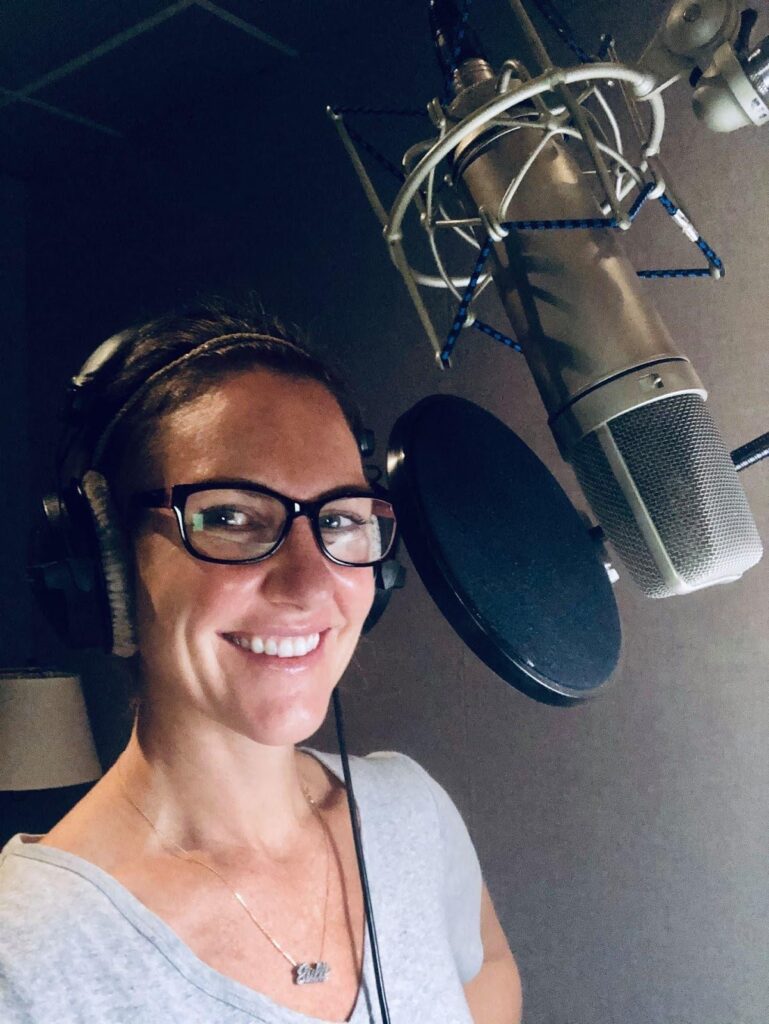
This week’s blog is brought to you by Julie Johnston, our Game Changer Coach, who is also our resident Public Speaking and Voice Over Coach. Julie has spent most of her life making the most of her voice. As a professional voice actor herself, she truly understands the power and impact a voice can have.
Julie explores the importance of understanding how you sound and how you are heard by others. We will explore tips and tricks to self-awareness and coaching yourself into better public speaking habits.
SPEAK NOW!
Ha! I was hoping a little Tay Swift reference would capture your attention. Speaking of capturing attention, do people’s voices ever make you stop and listen? Are there certain people that you just love to hear speak and would listen to them read the phone book simply because you so love the sound of their voice? I guarantee those people know the power in their voice and have learned to harness it for that reason. Years ago, my dad lost his ability to speak due to cancer. Not only did he lose his primary means of communication, but he also lost a lot of his identity and confidence. I have since realized how lucky we are to be able to speak and how much value finding your voice can have for your career.
Your voice is your brand
How much thought do you put into YOUR voice? Most people avoid the sound of their voice. They literally hate to hear it. But with all due respect, if we have to listen to you, don’t you think you should know what you sound like? Whether or not you speak for a living, your voice plays a major role in how people think of you. Teachers, pastors, tour guides, actors – they all rely on the power of their voices to capture their audience’s attention. But even if you don’t have a profession that requires you to speak in public, speech plays a major part in our jobs and daily life.
I am a professional voice actor; I speak for a living. Recording my voice for commercials and video content is one of the ways I make money, good money. Voice acting is a very hard industry to break into because it requires you to understand the power of your voice and know how to control and use it in ways that evoke emotion, convey a message, or persuade people to believe or do something. And being comfortable listening to yourself is a big part of the profession. It is not easy.
Listen to yourself
Even if voice acting is not your life’s goal, I still highly recommend paying attention to your voice and studying how it sounds to others. Voices have the power to command an audience, to draw people in, to spark thoughtful conversations, or to fascinate a crowd. The ability to control your volume, tone, cadence, emotion, and inflection can make all the difference in the world as to how your message is received.
Think of it this way, you could have the most profound and life changing thought, but if no one can hear you share it, or if no one listens because your voice is so painfully monotone, then your message is completely lost. Many highly intelligent people are not living up to their potential because they have trouble communicating their thoughts and just can’t get people’s attention. Due to their weak vocal projection, individuals often feel hesitant to express themselves in public settings and share their thoughts. Annoying voices can deter people from engaging in conversations and social interactions. Additionally, speaking too quickly can cause listeners to become disoriented and disengaged, leading them to lose interest and cease paying attention.
There is power in your voice that you have yet to uncover. But how do you begin to find your voice, and how do you learn to control it?
Here are some simple practices to help find your voice
WATCH AND FIND THE BAD HABITS
Record yourself. As painful as it may sound, you must really study what your voice sounds like. Record yourself ON CAMERA talking about something you are familiar with. Starting with a topic that doesn’t take much thought allows your speech to flow and your natural sound to come out. Watch the video back. Identify the nuances of your voice. Is it high-pitched or low? Using too many filler words like “Umm” and “Ah”? Count them! Do you speak so fast that even you can’t follow, or do you put in too many pauses that leave the story disjointed? Is there inflection or emotion? Are you giving cues if you are enjoying the story, you are telling or not caring much? Do you have a concise beginning, middle, and end to your story, or does it just drone on? Watch the video back a couple of times and take notes.
LISTEN FOR THE MESSAGE
Next, record yourself again telling a different story and using the notes you just gave yourself. You are not going to watch it back; you will only listen to it back. Listen to see if your voice has enough information and structure to allow the listener to follow along without your body language cues. When you can’t rely on your face and body to tell the story, are you able to make your voice interesting enough to keep the audience’s attention? Play with pauses. The pause is a magical trick that ensures people will hang on to your every word. Good pause placement can turn a boring story into a suspenseful one. Also, make sure your thoughts are concise.
Use the sandwich analogy when giving information or answering questions.
Start with the introduction to the topic or the questions being asked (top piece of bread), then give the details and make sure there are enough details to keep it interesting and thoughtful (that’s the meat), and then summarize or conclude with repeating the question or the topic you have just reviewed (the bottom piece of the bread)
UNDERSTAND THE EMOTION
The final time you record, play with your facial expressions and emotions. Talk for a little bit with a smile, and then change your face to a resting position or RBF, as I am sure you have called it. Then, change your facial expressions accordingly and say something serious, sad, or exciting. Listen back to the emotion-filled thoughts and ask yourself, if I didn’t know how I was really feeling, would I understand how I was feeling by the sound of my voice? Too many times, we do not allow our voices to convey what we are feeling, and that can confuse or mislead our audience. For example, if you smile when you are delivering sad news, well, then that’s just rude!
Some things to think about as you explore your voice
It takes most people 3 seconds to hear what you say and process it. So, when you speak too fast, especially when you are giving instructions or teaching a complex topic, you are not giving the audience enough time to keep up. That will usually result in them drifting off and not paying attention. That inevitably can cost you the job interview, the next date, or the next speaking opportunity.
If you are now interested in understanding the power of your voice and how to harness it, I highly recommend joining a Toastmasters Club in your area. Toastmasters is an international public speaking club with chapters all over the globe, where likeminded individuals work together on improving their public speaking skills. For more information on Toastmasters, click here.


